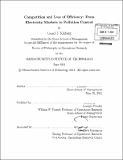Competition and loss of efficiency : from electricity markets to pollution control
Author(s)
Kluberg, Lionel J. (Lionel Jonathan)
DownloadFull printable version (10.87Mb)
Other Contributors
Massachusetts Institute of Technology. Operations Research Center.
Advisor
Georgia Perakis.
Terms of use
Metadata
Show full item recordAbstract
The thesis investigates the costs and benefits of free competition as opposed to central regulation to coordinate the incentives of various participants in a market. The overarching goal of the thesis is to decide whether deregulated competition is beneficial for society, or more precisely, in which context and under what market structure and what conditions deregulation is beneficial. We consider oligopolistic markets in which a few suppliers with significant market power compete to supply differentiated substitute goods. In such markets, competition is modeled through the game theoretic concept of Nash equilibrium. The thesis compares the Nash equilibrium competitive outcome of these markets with the regulated situation in which a central authority coordinates the decision of the market participants to optimize social welfare. The thesis analyzes the impact of deregulation for producers, for consumers and for society as a whole. The thesis begins with a general quantity (Cournot) oligopolistic market where each producer faces independent production constraints. We then study how a company with multiple subsidiaries can reduce its global energy consumption in a decentralized manner while ensuring that the subsidiaries adopt a globally optimal behavior. We finally propose a new model of supply function competition for electricity markets and show how the number of competing generators and the electrical network constraints affect the performance of deregulation.
Description
Thesis (Ph. D.)--Massachusetts Institute of Technology, Sloan School of Management, Operations Research Center, 2011. Cataloged from PDF version of thesis. Includes bibliographical references (p. 221-230).
Date issued
2011Department
Massachusetts Institute of Technology. Operations Research Center; Sloan School of ManagementPublisher
Massachusetts Institute of Technology
Keywords
Operations Research Center.